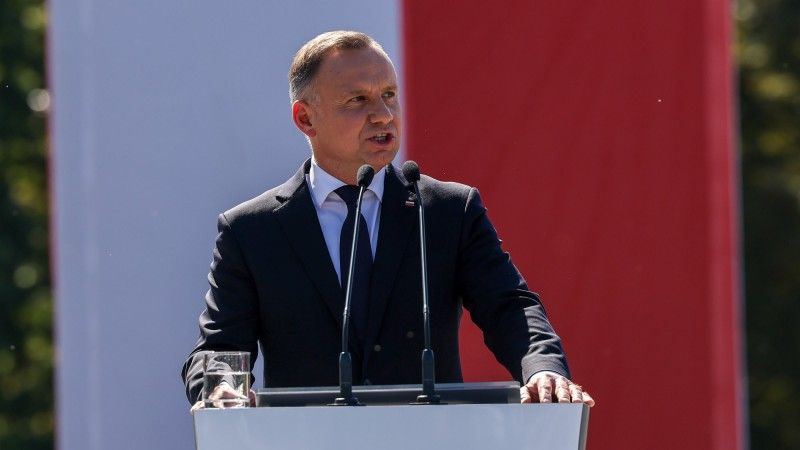Geopolitics
President of Poland sets off for Africa [OPINION]

The head of state is once again embarking on a journey to the African continent. This time, he will visit Kenya, Rwanda, and Tanzania (February 4-10). It marks another trip by President Duda to Africa, with a priority on the development of bilateral cooperation in political, economic, and military dimensions. Additionally, Poland intends to combat Russian disinformation in Africa and assess the potential for independent policy-making on the continent. This visit also provides an opportunity for the official opening of the Polish embassy in Rwanda.
President Duda’s last visit to Africa was in 2022 when he visited Senegal, Ivory Coast (which was also visited by the Chinese Minister of Foreign Affairs and the US Secretary of State in the past two weeks), and Nigeria. Although the visits were initially considered successful, there is still a lack of continuity in some of the projects discussed at that time. Importantly, each of these countries is open to cooperation with Poland. Poland has diplomatic missions in Senegal and Nigeria, and Ivory Coast is a priority for the location of the next embassy on the continent.
There was no planned visit in 2023, and hence the delegation is being carried out at the beginning of 2024. The countries were not chosen randomly. Due to recent discussions in West Africa, the Polish diplomatic goal now is to highlight its presence in the eastern part of the continent. This is likely to be the penultimate visit by the Polish president to Africa during his second term.
During President Duda’s tenure, there hasn’t been a significant breakthrough in the African direction, but apart from visits to the continent, notable events include participation in the Global Africa Business Initiative and a meeting with the President of Malawi during a delegation to the USA.
Kenya
The first destination for the President and the First Lady will be Kenya. Diplomatic relations between the countries were established on December 13, 1963, and a year later, Poland opened an embassy in Nairobi. The ambassador accredited in Poland resides in Berlin. So far, there have been no presidential-level talks.
Relations between the countries are characterized as good. Kenya is a beneficiary of Poland’s tied aid credit and development assistance. In recent years, Polish economic missions to Kenya have taken place, and economic and trade cooperation is developing. While there is nothing groundbreaking in this relationship, Kenya is a stable country open to new partners from Central and Eastern Europe. Currently, the United States is crucial for Kenya in both political and economic dimensions.
During the visit to Kenya, President Duda will discuss the regional security situation, Nairobi’s international engagement, food security issues, Russian disinformation, and possible areas for bilateral cooperation such as trade, support for green energy, credit cooperation, agricultural cooperation, opportunities for military cooperation (arms sales to Nairobi), and the opening of a Kenyan representation in Poland.
Rwanda
The next country on the itinerary is Rwanda, undoubtedly a key ally of Poland in Africa. Diplomatic relations were established on July 10, 1962. Since December 1, 2022, the operationalization of the Polish embassy in Kigali has been underway, with its official inauguration taking place now. Rwanda, in turn, opened its embassy in Warsaw on October 7, 2021. Importantly, there have been numerous ministerial-level meetings and talks since 2018, including the visit of Rwanda’s Minister of Foreign Affairs to Poland in June 2023. In Poland, an attaché of defence is accredited, one of two in the entire European Union (the other is in France).
Poland and Rwanda are entering the peak period of their cooperation, with trade volumes steadily increasing. In 2022 and 2023, key for Polish exports were weapons, ammunition, and military accessories, followed by grains, agricultural machinery, and electronic equipment. Several Polish companies are permanently present in Kigali, and in June 2023, the first EU-Rwanda Business Forum took place, with over 100 companies participating, including 12 from Poland. In addition to the economy, Rwanda benefits from Polish development aid for the years 2021-2030 and participates in Polish scholarship programs. Currently, around 1500 Rwandan students are studying in Poland, and Polish missionaries are active in Rwanda. President Duda will visit the school of the Franciscan Sisters for blind children in Kibeho.
The first topic of discussion for President Duda will be military cooperation. Polish Defence Group and other Polish entities have been building their presence in the Rwandan market for years, signing contracts for the sale of rifles, anti-drone radar, and helicopter maintenance and repair. Currently, Kigali is considering the purchase of anti-aircraft missile systems.
Other important topics will include migration on the African continent, the Rwandan-British agreement, and the situation on the Rwanda-DRC border, where there is a risk of war (until 2008, Poland had an embassy in Kinshasa; currently, we have our property there, and South Korea rents one building for its embassy). In addition to the above, the agenda includes issues related to building Polish presence in Africa and food security.
Tanzania
The last stop for the Polish delegation will be Tanzania. It’s worth noting that diplomatic relations were established in 1961, and by 1962, a Polish embassy was functioning in Dar es Salaam. The embassy had been closed in 2008, but its activities resumed in 2017. Tanzanians continue to handle our affairs from Berlin. In 2022, the then Minister of Foreign Affairs, Stergomena Tax, visited Poland.
Regarding the ongoing visit by the President of the Republic of Poland, it must be stated that Tanzania has the least potential for cooperation. Although the direction of the visit is correct (the region), Angola or Namibia could have been considered due to significantly greater potential for economic and political cooperation. Nevertheless, the willingness to resolve issues from the past, including those related to the implementation of contracts by Polish companies under the tied aid agreement from 2015, deserves attention.
The role of Samia Suluhu Hassan is also significant; she was sworn in as the president of the country, making her the first woman in the history of Tanzania to hold this position. One of the key changes she made was lifting the ban on political gatherings and rallies of opposition groups. The meeting between President Duda and President Hassan also has symbolic significance.
Tanzania belongs to the group of poorer African countries. Poland’s main export commodity is wheat, and tobacco is imported. Polish companies are trying to engage in the Tanzanian market (water economy, lighting, cybersecurity), and Zanzibar holds enormous importance in the context of tourism. The African country also benefits from Polish development aid and participates in the Stefan Banach scholarship program. There is a small Polish community in Tanzania.
The main topics of discussion include climate policy, as the Tanzanian president is a strong advocate for mitigating climate threats. Issues related to green technologies and Poland’s support for Africa will also be analyzed in the same context. Similarly to Kenya and Rwanda, food security and the harmful activities of the Russian Federation will be on the agenda.
A New (Polish) Chapter in Africa?
The visit by the President of the Republic of Poland to Africa is very important. It is pointless to determine whether it makes sense or not, as I have repeatedly emphasized that participating in the global race to build a presence on the African continent is mandatory for countries that want to matter on the international stage. If the Czech Republic, Hungary, Ukraine, Estonia (and, of course, the Russian Federation) decide on bilateral cooperation, opening new missions, and sending economic delegations, then Poland, even more so, should strive to join Central and Eastern European countries in this competition in Africa.
During President Andrzej Duda’s visit, the main goal is to revitalize contacts with Africa. The issue of cooperation with the African continent took a back seat after Russia’s invasion of Ukraine (war near the border with Poland); hence, the visit was postponed from February to September, 2022. Now there is an opportunity to renew relations and highlight key areas for realistic collaboration. Several agreements are ready to be signed – covering a very broad scope – which are intended to be the driving force for further joint actions.
If specific votes in UN forums, distancing from cooperation with Russia, or priority treatment are expected from African countries because Poland has never colonized Africa, then meetings with these African partners are necessary. President Andrzej Duda’s visit a few days after visits by Chinese and American delegations, and before Ukrainian, Russian, and French visits, indicates recognition of the African continent on the map of our foreign policy. It is certainly very late, but not too late, and cooperation can still be developed both at the political level and within the private sector.
The President, along with the First Lady, will have less than a week (February 4-10; including transportation) to once again draw attention to Poland’s presence in Africa. Hopefully, our delegation will make the best use of this time, and new pages in Polish-African relations will be written. It is essential to emphasize that the time after the visit will be even more critical – the implementation of the announced projects.
